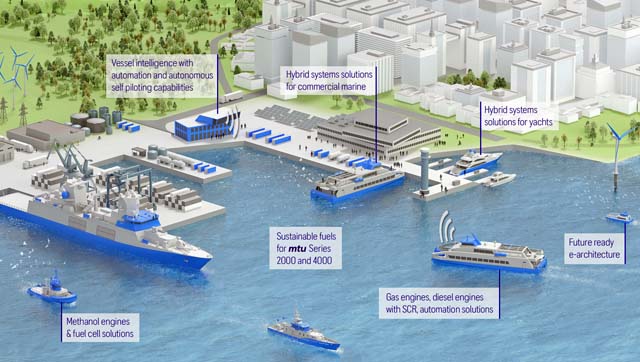Rolls-Royce has announced a timetable for its new sustainable mtu marine solutions for propulsion, automation and service, which include methanol engines, fuel cell concepts, hybrid systems, diesel engines with exhaust aftertreatment and for use with sustainable fuels, as well as mtu NautIQ marine automation products.
From 2026, methanol engines based on the mtu Series 4000 will be launched to the market. With E-methanol as a CO2-neutral fuel due to its production via renewable energies, there is potential to shape the energy transition in marine propulsion systems, for example for tugs, yachts, fast ferries and coastal shipping. The energy density of this fuel is high compared to other sustainable fuels, and its liquid state makes it easy to store and refuel at ambient temperatures. In addition to reduced complexity, the more attractive investment costs are another advantage of the methanol tank system.
Denise Kurtulus, VP Global Marine, Rolls-Royce, said: “We are clearly committed to methanol as a marine fuel for the future and want to be a pioneer here.”
Rolls-Royce Power Systems is already working on the development of fuel cell systems for marine applications and will launch its own mtu fuel cell systems for main propulsion and on-board power generation from 2028. Fuel cells powered by hydrogen do not produce emissions of CO2, NOx or particulates. Fuel cells powered by green methanol emit only small amounts of CO2 due to the required methanol reformer, but no more than was previously bound in the e-methanol and are thus operated in a CO2-neutral manner. Their low noise emissions and vibrations and their very high efficiency (approx. 50 – 60 %) are further advantages that make fuel cell systems interesting for shipping. Due to its physical properties, the introduction of hydrogen as a fuel for ships still poses some challenges, for example with regard to infrastructure and on-board bunkering.
From 2023, mtu Hybrid PropulsionPack for mtu Series 2000 and 4000 will be available for smaller vessels. The system intelligently combines diesel engines with electric propulsion modules, batteries, gearboxes, control and monitoring systems and other electronic components to provide speed, comfort, efficiency and local emission-free cruising as required. The mtu Hybrid PropulsionPack is offered in a power range from 1,119 kW to 4,300 kW by the diesel engines plus 165 kW to 743 kW by the electric motors per powertrain. The maximum propulsion power is 10,000 kW per vessel. To ensure the optimum propulsion solution for each type of ship, Rolls-Royce offers a modular kit with standardised components.
Rolls-Royce had announced in 2021, through its ‘Net Zero at Power Systems’ sustainability programme, that it would realign the Power Systems business unit’s product portfolio so that by 2030, sustainable fuels and new mtu technologies would reduce greenhouse gas emissions by 35 percent compared to 2019 levels.
Kurtulus said: “Since the last SMM in 2018, we have completely realigned our marine portfolio to actively support our customers on their journey to carbon neutrality.”



